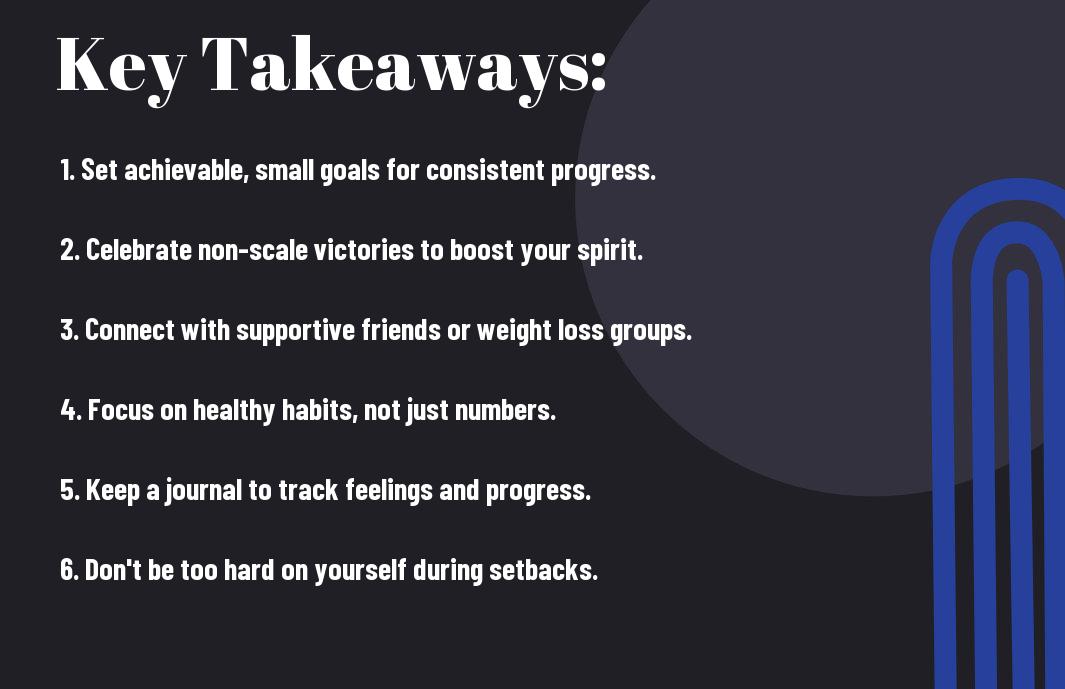It’s common to feel overwhelmed when weight loss seems out of reach, but you have the power to reignite your motivation. This guide will provide you with practical strategies and insights to help you stay committed to your goals, even when the scale doesn’t reflect your efforts. By understanding your mindset and implementing small but impactful changes, you can navigate through the challenges of your weight loss journey with renewed determination. Let’s explore how you can maintain a positive outlook and keep pushing forward, no matter how tough things get.
Key Takeaways:
- Set realistic goals: Break down your weight loss targets into smaller, achievable milestones to maintain motivation throughout the journey.
- Celebrate progress: Acknowledge and reward yourself for any progress made, no matter how small, to reinforce positive behavior and keep spirits high.
- Create a support system: Surround yourself with friends, family, or community groups that encourage and motivate you, making the weight loss journey feel less isolating.

Understanding Weight Loss Challenges
Before initiateing on your weight loss journey, it’s important to recognize that challenges will inevitably arise. Whether it’s fluctuating motivation or external pressures, understanding these hurdles is the first step in overcoming them. Acknowledging that you may face obstacles can empower you to develop strategies for navigating through the tough times, ultimately leading to lasting success.
Common Obstacles
Understanding the common obstacles can help you prepare for setbacks that might challenge your weight loss efforts. These may include time constraints, lack of access to healthy food, or competing priorities that pull you away from your goals. By identifying these barriers, you can create actionable plans to address them and stay focused on your journey.
Psychological Barriers
On your weight loss journey, psychological barriers such as self-doubt or negative self-talk can hold you back. These mental roadblocks often lead to feelings of inadequacy, making it harder for you to stay committed to your goals. Recognizing how these thoughts affect your motivation is vital for fostering a healthier mindset.
And as you confront these psychological barriers, it’s important to remember that your mindset plays a significant role in your success. Challenge negative thoughts by replacing them with affirmations of your potential. You might find it helpful to practice mindfulness or seek support from others who understand what you’re going through. By addressing these mental challenges head-on, you can cultivate resilience and stay focused on your weight loss goals.
Setting Realistic Goals
Assuming you want to achieve sustainable weight loss, setting realistic goals is important for maintaining motivation. Break down your journey into manageable targets that consider your lifestyle, body type, and personal preferences. Aiming for small, attainable changes will help you stay focused and avoid feeling overwhelmed. Celebrate your progress along the way, allowing yourself to appreciate the efforts you put in, which can make the process feel less daunting.
SMART Goals
Among the methods to define your weight loss goals effectively, the SMART criteria—Specific, Measurable, Achievable, Relevant, Time-bound—can guide you. By crafting goals that meet these standards, you will clarify your objectives and track your progress efficiently. This structured approach helps reinforce your determination and provides a clear path towards reaching your desired outcomes.
Short-term vs. Long-term Goals
The distinction between short-term and long-term goals is significant in your weight loss journey. Short-term goals provide immediate achievements that can boost your motivation, while long-term goals create a sustainable vision for your health. Balancing both types enables you to enjoy quick wins while keeping an eye on your overarching objectives.
For instance, you might set a short-term goal to lose 5 pounds within a month, which feels manageable and provides an immediate sense of accomplishment. Conversely, your long-term goal could focus on a healthier lifestyle, such as maintaining your ideal weight for a year. This combination helps you stay engaged and motivated, as you can celebrate progress along the way while working towards a larger vision of health and well-being.
Creating a Sustainable Plan
Keep in mind that creating a sustainable weight loss plan requires a thoughtful approach tailored to your lifestyle. Set realistic goals and make small, incremental changes that you can maintain over time, rather than drastic alterations that can lead to burnout. Consistency is key, so focus on developing habits that fit seamlessly into your daily routine.
Nutrition Strategies
About your nutrition, it’s important to prioritize whole, nutrient-dense foods while minimizing processed options. Focus on balanced meals that include an array of fruits, vegetables, lean proteins, and whole grains. (Consider planning your meals in advance to avoid impulsive eating decisions.)
Exercise Routines
Routines play a significant role in how you incorporate exercise into your weight loss journey. Choose activities that you enjoy to stay engaged and motivated. (Select a combination of cardiovascular workouts, strength training, and flexibility exercises.)
By establishing a consistent exercise routine, you can enhance your weight loss efforts and improve overall well-being. Aim for at least 150 minutes of moderate activity each week, and remember to include strength training at least twice a week. (Stay flexible with your schedule to accommodate life’s unexpected events.)
Nutrition is an equally important component of your weight loss plan. Aim to consume balanced meals regularly to keep your metabolism active and support your energy levels. Don’t shy away from seeking professional advice to help you build a personalized nutrition strategy that meets your needs and goals. (Commit to tracking your food intake to develop a greater awareness of your eating habits.)

Building a Support System
Once again, surrounding yourself with a strong support system can significantly enhance your weight loss journey. Engaging with friends, family, or others who share similar goals creates a network of encouragement and accountability. This connection can help you celebrate victories and face challenges together, making your path toward weight loss not just manageable but also enjoyable. You don’t have to go through this alone; seeking out support is a vital step in maintaining your motivation.
Finding Accountability Partners
Below, you can find accountability partners who share your fitness goals and can motivate you to stay committed. (Deciding to connect with someone can lead to a more productive journey.) These can be friends, family members, or even colleagues who understand your struggle and can check in on your progress regularly. Their encouragement will provide you with the motivation to push through tough days, making it easier to stay on track.
Joining Support Groups
Before you take the plunge into your weight loss journey, consider joining support groups to gain valuable insights and camaraderie. Surrounding yourself with like-minded individuals can amplify your motivation and provide an encouraging environment where you can exchange tips and experiences. Not only will you find emotional support, but you’ll also build connections with others who truly understand your journey.
It can be beneficial to explore local or online support groups tailored to weight loss. These groups often offer resources, motivational talks, and a safe space to share your wins and setbacks. Participating in discussions and hearing others’ success stories can reignite your determination and inspire new strategies for your own journey. Engaging with people who are navigating similar challenges instills a sense of belonging and reinforces your commitment to achieving your weight loss goals.
Maintaining a Positive Mindset
All aspects of your weight loss journey can be influenced by your mindset. To foster a positive attitude, focus on progress rather than perfection. Embrace self-compassion and recognize each small victory, as this builds resilience and keeps you motivated. Cultivating an optimistic outlook will empower you to push through challenges, making weight loss feel less daunting.
Affirmations and Visualization
Above all, the practice of daily affirmations and visualization can significantly enhance your mindset. By consistently affirming your goals and visualizing your success, you create a mental image that inspires you to take action. (Make your affirmations specific to reinforce your commitment.) This technique allows you to align your thoughts with your ambitions, ultimately strengthening your resolve to achieve your weight loss goals.
Overcoming Setbacks
Visualization can play a key role when facing setbacks on your weight loss journey. As you encounter obstacles, envision yourself overcoming them and returning to your healthy habits. This mental exercise can help reduce feelings of discouragement and reinforce your determination. (A vital decision here is to view setbacks as opportunities for growth rather than failures.) Shifting your perspective in this way can keep you on track and focused on your ultimate goals.
Another strategy for overcoming setbacks is to develop a support system. Surround yourself with individuals who inspire and uplift you, sharing experiences and encouragement. Engage with communities, whether online or in-person, where positive reinforcement is the norm. With this support, you can navigate challenges together, transforming setbacks into growth opportunities. (It’s important to actively seek out these connections to empower your journey.)
Tracking Progress
Despite the challenges you may face during your weight loss journey, tracking your progress can provide you with a sense of achievement and motivation. Keeping a record of your efforts allows you to see how far you’ve come, reinforcing your commitment to your goals. By documenting your activities, meals, and feelings, you can identify patterns and make necessary adjustments to stay on track toward your desired outcomes.
Monitoring Physical Changes
Progress can be measured through various physical changes over time, such as improvements in your body measurements, clothing fit, and overall energy levels. Instead of solely focusing on the scale, take note of how your body responds to your efforts. This approach promotes a healthier relationship with your weight loss journey by highlighting positive changes that may not be reflected in numbers alone.
Celebrating Non-Scale Victories
Tracking your journey involves recognizing and celebrating the non-scale victories that occur along the way. These moments showcase your dedication and commitment to a healthier lifestyle.
And these victories can include milestones such as increased stamina during workouts, improved flexibility, better sleep quality, or simply feeling more confident in your clothes. By acknowledging these achievements, you not only motivate yourself to stay on course, but you also cultivate a positive mindset that reinforces healthy habits. Make it a point to celebrate each non-scale victory, as they are instrumental in sustaining your motivation and encouraging continued progress on your journey to better health.
Final Words
Ultimately, maintaining motivation during your weight loss journey is about cultivating a positive mindset, setting achievable goals, and celebrating small victories. Embrace the process by surrounding yourself with supportive individuals, tracking your progress, and finding joy in activities that promote health. When challenges arise, remind yourself that setbacks are part of growth, and focus on the progress you’ve made rather than the obstacles. By nurturing your determination and resilience, you can turn what feels impossible into a journey of empowerment and success.
Q: What are some effective strategies to maintain motivation during my weight loss journey?
A: Maintaining motivation can be challenging, but there are several strategies that can help. First, set small, achievable goals that lead to your larger objective. This allows you to celebrate little victories along the way. Second, consider finding a support system, whether it’s friends, family, or online communities, to share your journey and hold each other accountable. Lastly, keep a journal to track your progress, feelings, and experiences. Reflecting on your entries can remind you of how far you’ve come and strengthen your determination.
Q: How do I handle setbacks without losing motivation in my weight loss efforts?
A: Setbacks are a natural part of any journey, and it’s important to approach them with a positive mindset. Instead of seeing a setback as a failure, view it as an opportunity to learn about what works for your body and what might not. Reflect on the circumstances that led to the setback and adjust your plans accordingly. Engaging in self-compassion is also vital; treat yourself with kindness rather than criticism. Finally, revisit your motivations for wanting to lose weight. This can help reignite your passion and commitment to your goals.
Q: How can I stay motivated when the weight isn’t coming off as quickly as I hoped?
A: Slow progress can be disheartening, but it’s important to focus on the bigger picture. Remind yourself that sustainable weight loss takes time and is a journey rather than a race. Shift your focus from the scale to other indicators of progress, such as improved energy levels, better sleep, or fitting into clothes more comfortably. Incorporate enjoyable physical activities and healthy recipes into your routine to make the process fun rather than a chore. Surround yourself with positivity and affirmations, and give yourself credit for the efforts you’re making, even if the results aren’t immediately visible.










Reply